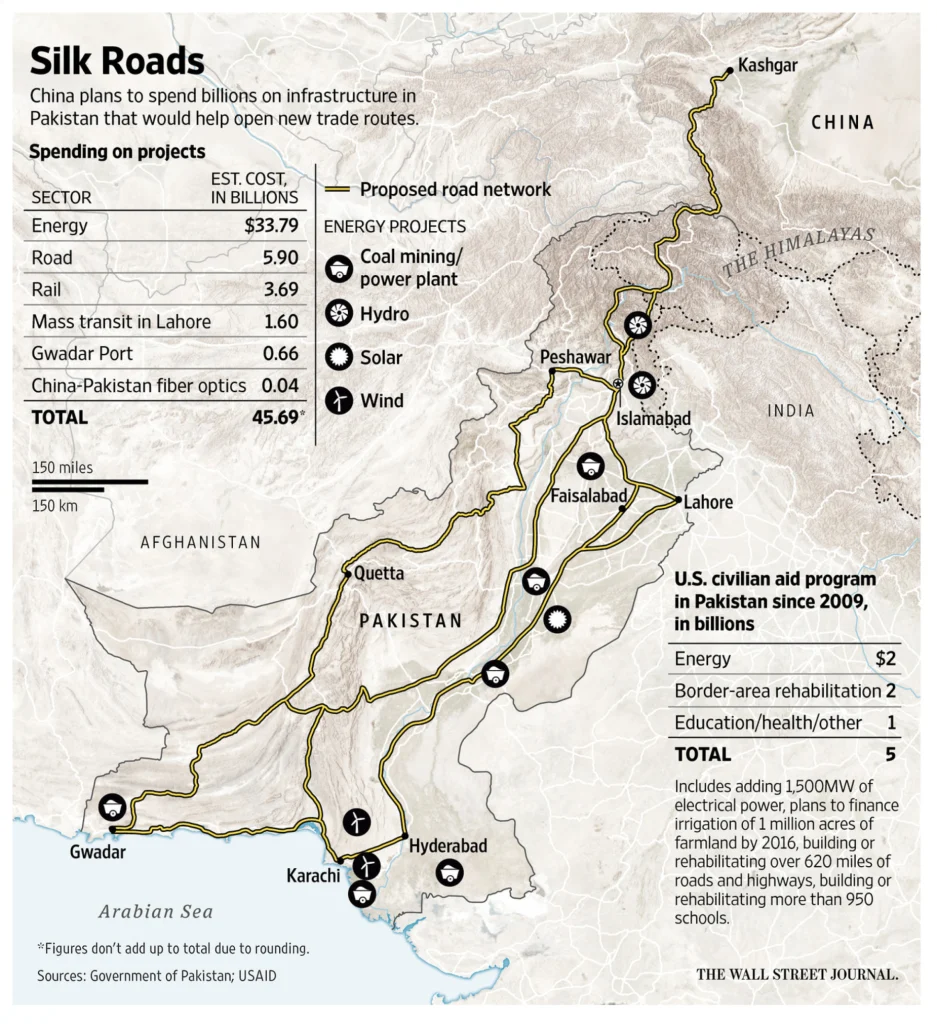Pakistan’s transit trade dilemma: Balancing security and economic relations
The Afghanistan Pakistan Transit Trade Agreement (ATTA) has been subject to misuse, resulting in economic damage to Pakistan. In response, Pakistan has implemented several measures to tighten the transit trade regime. These measures include banning the import of certain goods prone to smuggling, imposing processing fees on the import of specific items, and mandating Afghan importers to submit bank guarantees.
An early evaluation, as soon as next month, should shed light on whether these measures have been successful in achieving their intended objectives. Such an evaluation is essential because there are concerns within the services sector that argue these measures may have adverse effects on businesses and the well-being of the population in Balochistan and Khyber Pakhtunkhwa, particularly those involved in transportation, storage, and distribution sub-sectors. In the end, stringent curbs could mean a greater incentive for smuggling. An increase in the cost of imports for Afghan businesses and consumers could also negatively impact the Afghan economy. It remains unclear if these measures will apply to cargo bound for Central Asian countries.
The timing of this move, coinciding with the eviction of Afghans living in Pakistan without formal permissions, makes the tightening of the transit trade regime somewhat controversial. Some experts contend that these steps were long overdue and necessary to combat smuggling and safeguard the Pakistani economy. On the other hand, some argue that these measures are discriminatory and may violate international trade laws.
The World Trade Organization (WTO) allows members to take protective measures for their domestic industries. Pakistan asserts that its recent actions are essential to safeguard its domestic industries from smuggling. The WTO forbids members from imposing new or increased duties on imported goods without prior consultation with affected members. Pakistan, in imposing a processing fee on certain goods from Afghanistan, maintains that this fee is not a tariff but rather covers the cost of administering the transit trade regime.
Following these decisions, social media has been flooded with Afghan consumers urging their government to seek more reliable transit trade partners, which negatively impacts Pakistan’s reputation among Afghan importers and consumers. This, in turn, has repercussions for people-to-people relations between the two countries. To rebuild trust and position itself as a dependable transit and trade partner in the region, Pakistan should consider several strategies.
While a reversal of recent steps may be challenging, regular monitoring of smuggled goods and a subsequent decline in their incidence could lead to a reduction in imposed duties and fees by Pakistan. Both sides must engage in dialogues to address concerns that prompted the tightening of the transit trade regime. Pakistan should collaborate with Afghanistan to develop new measures to combat smuggling and protect Pakistan’s security interests, with technology potentially offering solutions.
Local business associations in Pakistan should view this situation as an opportunity to increase their exports to Afghanistan, given the increased cost of goods via transit. These associations should send business delegations and host trade fairs in major Afghan cities. Higher transit costs may also attract increased investments from Pakistani businesses willing to provide end-to-end facilitation in agriculture, infrastructure, and connectivity initiatives, fostering improved bilateral investment cooperation. To ensure smooth transit, bilateral commercial trade, and investment, a predictable dispute resolution mechanism should be established on both sides.
These measures should be supplemented by joint patrols of the border, enhanced intelligence sharing, and the establishment of joint border crossing points. Both sides should consider reestablishing contact via Joint Economic Commission to oversee the trade relationship. This commission should expedite efforts to resolve trade disputes, identify opportunities for increased trade, and promote cooperation between Pakistani and Afghan businesses, ultimately fostering cultural and educational exchanges between the two countries.
In a landscape where the neighbours of landlocked countries compete on logistics efficiency, Pakistan can enhance its competitiveness by reducing transit costs.
Dr. Vaqar Ahmed
Looking ahead, Pakistan should align itself with internationally recognized principles of transit trade. These principles encompass non-discrimination, ensuring that transit trade policies do not favor specific countries or types of goods; transparency, ensuring that policies are clear and predictable; efficiency, streamlining transit trade procedures to reduce costs and delays; security, safeguarding goods and preventing smuggling; and facilitation, reducing bureaucracy and red tape to promote trade. If Pakistan aims to position itself as a transit country for goods destined for Afghanistan, Central Asia, China, and other economies, it should prioritize simplifying transit procedures, reducing the number of required documents, streamlining clearance processes, and expedite implementation of electronic systems.
In a landscape where the neighbors of landlocked countries compete on logistics efficiency, Pakistan can enhance its competitiveness by reducing transit costs through lower tariffs, improved infrastructure, and tax incentives for transit businesses. Investing in modern equipment and training for border officials to improve border management is essential. Collaborating with other countries to enhance transit infrastructure, streamline procedures, and reduce costs should be a recurring agenda item.
The Afghanistan Pakistan Transit Trade Agreement (ATTA) has been subject to misuse, resulting in economic damage to Pakistan. In response, Pakistan has implemented several measures to tighten the transit trade regime. These measures include banning the import of certain goods prone to smuggling, imposing processing fees on the import of specific items, and mandating Afghan importers to submit bank guarantees.
An early evaluation, as soon as next month, should shed light on whether these measures have been successful in achieving their intended objectives. Such an evaluation is essential because there are concerns within the services sector that argue these measures may have adverse effects on businesses and the well-being of the population in Balochistan and Khyber Pakhtunkhwa, particularly those involved in transportation, storage, and distribution sub-sectors. In the end, stringent curbs could mean a greater incentive for smuggling. An increase in the cost of imports for Afghan businesses and consumers could also negatively impact the Afghan economy. It remains unclear if these measures will apply to cargo bound for Central Asian countries.
The timing of this move, coinciding with the eviction of Afghans living in Pakistan without formal permissions, makes the tightening of the transit trade regime somewhat controversial. Some experts contend that these steps were long overdue and necessary to combat smuggling and safeguard the Pakistani economy. On the other hand, some argue that these measures are discriminatory and may violate international trade laws.
The World Trade Organization (WTO) allows members to take protective measures for their domestic industries. Pakistan asserts that its recent actions are essential to safeguard its domestic industries from smuggling. The WTO forbids members from imposing new or increased duties on imported goods without prior consultation with affected members. Pakistan, in imposing a processing fee on certain goods from Afghanistan, maintains that this fee is not a tariff but rather covers the cost of administering the transit trade regime.
Following these decisions, social media has been flooded with Afghan consumers urging their government to seek more reliable transit trade partners, which negatively impacts Pakistan’s reputation among Afghan importers and consumers. This, in turn, has repercussions for people-to-people relations between the two countries. To rebuild trust and position itself as a dependable transit and trade partner in the region, Pakistan should consider several strategies.
While a reversal of recent steps may be challenging, regular monitoring of smuggled goods and a subsequent decline in their incidence could lead to a reduction in imposed duties and fees by Pakistan. Both sides must engage in dialogues to address concerns that prompted the tightening of the transit trade regime. Pakistan should collaborate with Afghanistan to develop new measures to combat smuggling and protect Pakistan’s security interests, with technology potentially offering solutions.
Local business associations in Pakistan should view this situation as an opportunity to increase their exports to Afghanistan, given the increased cost of goods via transit. These associations should send business delegations and host trade fairs in major Afghan cities. Higher transit costs may also attract increased investments from Pakistani businesses willing to provide end-to-end facilitation in agriculture, infrastructure, and connectivity initiatives, fostering improved bilateral investment cooperation. To ensure smooth transit, bilateral commercial trade, and investment, a predictable dispute resolution mechanism should be established on both sides.
These measures should be supplemented by joint patrols of the border, enhanced intelligence sharing, and the establishment of joint border crossing points. Both sides should consider reestablishing contact via Joint Economic Commission to oversee the trade relationship. This commission should expedite efforts to resolve trade disputes, identify opportunities for increased trade, and promote cooperation between Pakistani and Afghan businesses, ultimately fostering cultural and educational exchanges between the two countries.
Looking ahead, Pakistan should align itself with internationally recognized principles of transit trade. These principles encompass non-discrimination, ensuring that transit trade policies do not favor specific countries or types of goods; transparency, ensuring that policies are clear and predictable; efficiency, streamlining transit trade procedures to reduce costs and delays; security, safeguarding goods and preventing smuggling; and facilitation, reducing bureaucracy and red tape to promote trade. If Pakistan aims to position itself as a transit country for goods destined for Afghanistan, Central Asia, China, and other economies, it should prioritize simplifying transit procedures, reducing the number of required documents, streamlining clearance processes, and expedite implementation of electronic systems.
In a landscape where the neighbors of landlocked countries compete on logistics efficiency, Pakistan can enhance its competitiveness by reducing transit costs through lower tariffs, improved infrastructure, and tax incentives for transit businesses. Investing in modern equipment and training for border officials to improve border management is essential. Collaborating with other countries to enhance transit infrastructure, streamline procedures, and reduce costs should be a recurring agenda item.
— Dr. Vaqar Ahmed is joint executive director at the Sustainable Development Policy Institute (SDPI). He has served as an adviser to the UN Development Programme (UNDP) and has undertaken assignments with the Asian Development Bank, the World Bank, and the Finance, Planning, and Commerce Ministries in
Read more:
| If Pakistan can sustain its crackdown on shadow markets, regional stability will follow |





